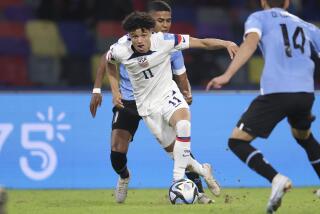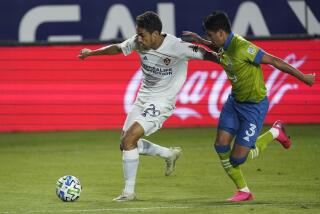THE BATTLE LOOMS
- Share via
SAINT-JEAN D'ARDIERES, France — It was just another pain in the Team USA travel itinerary, just another photo op on a phony soccer field set up by a shoe company in the center of Paris, but Frankie Hejduk was stoked.
“Awesome!” Hejduk exclaimed as he laid eyes on the artificial pitch.
A few shoulders in the group shrugged.
Awesome?
“Dude, check it out!” Hejduk insisted. “They’ve got a soccer field in the middle of the city! That’s awesome!”
A few hours earlier, Hejduk had played on a real soccer field in the center of Paris, against real Germans in the biggest soccer tournament in the world, coming on as a second-half substitute.
And he had his shorts on backward.
Unlike some of his teammates, however, Hejduk hadn’t succumbed to sensory overload, to nervous absent-mindedness. He had purposely put his shorts on backward.
“Rally cap, dude, rally cap,” Hejduk explained.
Sent into the game in the 46th minute after the rest of Team USA had been turned inside out for the first 45, Hejduk and his backward pants nearly became the fashion statement of the summer when he quickly dived onto a cross by David Regis and headed the ball so sharply inside the left post it almost caught German goalkeeper Andreas Kopke flat-footed.
Kopke had to scramble to bat the ball away at the last instant, depriving America, and the planet, of one of those frozen, gilded moments in time--the World Cup debut of the wild, loose-limbed goal celebration Hejduk calls “the Marley Skank.”
Named after reggae great--and Hejduk favorite--Bob Marley, the Marley Skank received its first significant air time April 22 in Vienna, when Hejduk scored the first goal in a 3-0 American victory over Austria. It was something to behold--head bobbing, arms akimbo, legs flying all over the place, the sort of thing that would alarm the French police if an English fan was spotted in public doing the same thing.
Hejduk says he practiced it many times before trotting it out.
He may get another chance Sunday in Lyon, where he is expected to start at right midfielder, climaxing one of the truly astounding success stories of this tournament.
Seventeen months ago, Hejduk’s career with the U.S. national team had all but washed out, done in by a tug-of-war between the hang-loose lifestyle of a surfer and the regimented demands of international soccer.
In late January 1997, with the U.S. team booked on a exhibition tour in China, Hejduk overslept and missed the team flight. His surfer’s wristwatch, the one with the built-in alarm, let him down.
“It didn’t go off,” Hejduk says. “I usually awake to that alarm watch every day. Now, I set six of them.”
Instead, Hejduk awakened in a cold sweat, staring incredulously at his gold-bricking alarm watch.
“I was like, ‘ . . . !’ y’know?” Hejduk says, recalling the chill. “I couldn’t believe it. I was kind of in a panic state. By the time I called Steve [Sampson, the U.S. coach] on his cell phone, it was too late to get to the jet.
“Steve said, ‘The plane’s almost in the air. There’s nothing we can do. I’ll talk to you when we get back.’ ”
So Hejduk’s luggage, sent ahead with the rest of the team’s, made it to China without Frankie. While his teammates were playing overseas, Hejduk stewed in Cardiff, fearing the worst.
“I thought I had blown it,” he says. “Oh yeah. That definitely went through my mind. I was stupid. I thought I’d blown it.”
Hejduk spent the next four months in limbo, playing and practicing only with his Major League Soccer club, the Tampa Bay Mutiny.
Finally, Sampson called him in for a meeting, which Hejduk describes as “a long discussion, really good, just the two of us. We agreed to put it behind us. I admitted my stupidity and that was it.”
Hejduk acknowledged the episode “kind of woke me up. I’ve been playing soccer since I was 4 years old with a chance to be in the World Cup. Here I was--letting it slip away. That kind of woke me up, showed me what I was missing.”
That and getting married and starting a family. Hejduk proposed to his wife, Kim, in 1997--in the Pacific Ocean, with one arm wrapped around a surfboard.
“I had it planned,” he proudly reports--and Kim gave birth to a son, Frankie Nesta, on Feb. 25.
“I kind of used to be carefree, didn’t really worry about anything,” Hejduk says. “Now it’s, like, I have someone to support and someone to be a role model for. So I realize how important my soccer career is.”
Characters, as much as character, are important within the framework of any team, which Sampson has recognized. A sort of Jeff Spicoli in shinguards, Hejduk, 23, is immensely popular with his teammates, who call him, “Bro,” thanks to Hejduk’s habit of tacking that stray syllable onto the end of most sentences.
(Actually, in Frankie-speak, “bro” and “dude” are interchangeable salutations.)
In early 1997, Sampson wrote to the U.S. Soccer Federation on the need to recruit more players “with personality, players like Frankie Hejduk.”
In particular, players with personality, like Frankie Hejduk, with Frankie Hejduk’s foot speed. Hejduk may be the fastest player on the U.S. squad and his bursts down the right flank toward goal are invaluable for team morale.
“He had immediate impact when he came in against Germany,” Sampson says.
“Frankie has a lot of pace and intensity in his game,” U.S. midfielder Ernie Stewart adds. “We forgot about that in the first half with Germany. Frankie brought a lot of that back when he came in.”
Hejduk would have started against Germany but a troublesome hamstring injury had limited his training. Last week, Sampson scheduled a “friendly” match against a French Second Division club team and after 30 minutes, Hejduk collapsed in exhaustion, then lay on his back for a good 20 seconds.
“To me, that was a good indicator that he was not 90-minutes fit,” Sampson says.
Part of the problem, Hejduk explains, has been the lack of waves available in inland France.
“I attribute a lot of my fitness work to surfing,” he says. “It gives you a good workout while you’re out there. It’s good cardiovascular work. You’re constantly paddling, you’re using your legs, your arms, your upper body, your lower body.
“Before, I would never have to run to keep in shape. I would surf every day and it would keep me fit.”
Hejduk says his surfing buddies “always give me stick for what I’m doing right now while they’re at home, playing around on the waves. But I wouldn’t change it for anything in the world. I’ll get to do plenty of that when I retire.
“And,” he adds with a laugh, “when they’re working.”
Besides, Hejduk points out, having a bro on the U.S. national team “gives them an excuse to go to the bars at home and watch the games.”
Sunday, that will be Frankie up there on the big screen, running and dribbling in the World Cup against the Iranians.
Dude, check it out!
More to Read
Go beyond the scoreboard
Get the latest on L.A.'s teams in the daily Sports Report newsletter.
You may occasionally receive promotional content from the Los Angeles Times.






